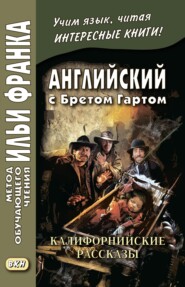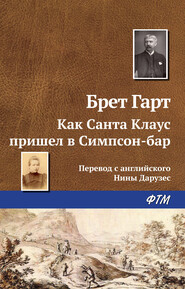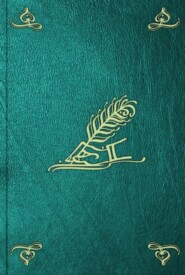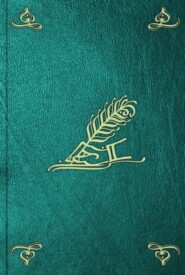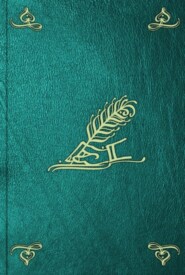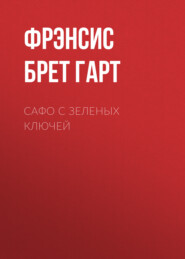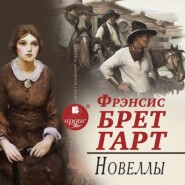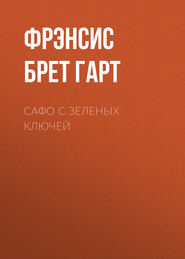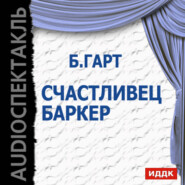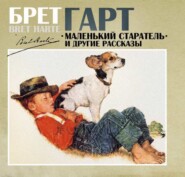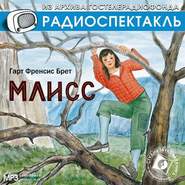По всем вопросам обращайтесь на: info@litportal.ru
(©) 2003-2024.
✖
Gabriel Conroy
Автор
Год написания книги
2017
Настройки чтения
Размер шрифта
Высота строк
Поля
"But come, my son," said Padre Felipe, laying his large soft hand, parentally, on Arthur's shoulder. "Come, come with me to my rooms. Thanks to the Blessed Virgin I have still shelter and a roof to offer you. Ah!" he added, stroking Arthur's riding-coat, and examining critically as if he had been a large child, "what have we – what is this, eh? You are wet with this heretic fog – eh? Your hands are cold, and your cheeks hot. You have fatigue! Possibly – most possibly, hunger! No! No! It is so. Come with me, come!" and drawing Arthur's passive arm through his own, he opened the vestry door, and led him across the little garden, choked with débris and plaster of the fallen tower, to a small adobe building that had been the Mission schoolroom. It was now hastily fitted up as Padre Felipe's own private apartment and meditative cell. A bright fire burned in the low, oven-like hearth. Around the walls hung various texts illustrating the achievement of youthful penmanship with profound religious instruction. At the extremity of the room there was a small organ. Midway and opposite the hearth was a deep embrasured window – the window at which two weeks before, Mr. Jack Hamlin had beheld the Donna Dolores. "She spent much of her time here, dear child, in the instruction of the young," said Father Felipe, taking a huge pinch of snuff, and applying a large red bandana handkerchief to his eyes and nose. "It is her best monument! Thanks to her largess – and she was ever free-handed, Don Arturo, to the Church – the foundation of the Convent of our Lady of Sorrows, her own patron saint, thou seest here. Thou knowest, possibly – most possibly as her legal adviser – that long ago, by her will, the whole of the Salvatierra Estate is a benefaction to the Holy Church, eh?"
"No, I don't!" said Arthur, suddenly, awakening with a glow of Protestant and heretical objection that was new to him, and eyeing Padre Felipe with the first glance of suspicion he had ever cast upon that venerable ecclesiastic. "No, sir, I never heard any intimation or suggestion of the kind from the late Donna Dolores. On the contrary, I was engaged" —
"Pardon – pardon me, my son," interrupted Father Felipe, taking another large pinch of snuff. "It is not now, scarce twenty-four hours since the dear child was translated – not in her masses and while her virgin strewments are not yet faded – that we will talk of this" (he blew his nose violently). "No! All in good time – thou shalt see! But I have something here," he continued, turning over some letters and papers in his desk. "Something for you – possibly, most possibly, more urgent. It is a telegraphic despatch for you, to my care."
He handed a yellow envelope to Arthur. But Poinsett's eyes were suddenly fixed upon a card which lay upon Padre Felipe's table, and which the Padre's search for the despatch had disclosed. Written across its face was the name of Colonel Culpepper Starbottle of Siskiyou! "Do you know that man?" asked Poinsett, holding the despatch unopened in his hand, and pointing to the card.
Father Felipe took another pinch of snuff. "Possibly – most possibly! A lawyer, I think – I think! Some business of the Church property! I have forgotten. But your despatch, Don Arturo. What says it? It does not take you from us? And you – only an hour here?"
Father Felipe paused, and looking up innocently, found the eyes of Arthur regarding him gravely. The two men examined each other intently. Arthur's eyes, at last, withdrew from the clear, unshrinking glance of Padre Felipe, unabashed but unsatisfied. A sudden recollection of the thousand and one scandals against the Church, and wild stories of its far-reaching influence – a swift remembrance of the specious craft and cunning charged upon the religious order of which Padre Felipe was a member – scandals that he had hitherto laughed at as idle – flashed through his mind. Conscious that he was now putting himself in a guarded attitude before the man with whom he had always been free and outspoken, Arthur, after a moment's embarrassment that was new to him, turned for relief to the despatch and opened it. In an instant it drove all other thoughts from his mind. Its few words were from Dumphy and ran, characteristically, as follows: "Gabriel Conroy arrested for murder of Victor Ramirez. What do you propose? Answer."
Arthur rose to his feet. "When does the up-stage pass through San Geronimo?" he asked, hurriedly.
"At midnight!" returned Padre Felipe. "Surely, my son, you do not intend" —
"And it is now nine o'clock," continued Arthur, consulting his watch. "Can you procure me a fresh horse? It is of the greatest importance, Father," he added, recovering his usual frankness.
"Ah! it is urgent! – it is a matter" – suggested the Padre, gently.
"Of life and death!" responded Arthur gravely.
Father Felipe rang a bell and gave some directions to a servant, while Arthur, seating himself at the table, wrote an answer to the despatch. "I can trust you to send it as soon as possible to the telegraph office," he said, handing it to Father Felipe.
The Padre took it in his hand, but glanced anxiously at Arthur. "And Donna Maria?" he said, hesitatingly; "you have not seen her yet! Surely you will stop at the Blessed Fisherman, if only for a moment, eh?"
Arthur drew his riding-coat and cape over his shoulders with a mischievous smile. "I am afraid not, Father; I shall trust to you to explain that I was recalled suddenly, and that I had not time to call; knowing the fascinations of your society, Father, she will not begrudge the few moments I have spent with you."
Before Father Felipe could reply the servant entered with the announcement that the horse was ready.
"Good-night, Father Felipe," said Arthur, pressing the priest's hands warmly, with every trace of his former suspiciousness gone. "Good night. A thousand thanks for the horse. In speeding the parting guest," he added, gravely, "you have perhaps done more for the health of my soul than you imagine – good-night. Adios!"
With a light laugh in his ears, the vision of a graceful, erect figure, waving a salute from a phantom steed, an inward rush of the cold grey fog, and muffled clatter of hoofs over the mouldy and mossy marbles in the churchyard, Father Felipe parted from his guest. He uttered a characteristic adjuration, took a pinch of snuff, and closing the door, picked up the card of the gallant Colonel Starbottle and tossed it into the fire.
But the perplexities of the holy Father ceased not with the night. At an early hour in the morning, Donna Maria Sepulvida appeared before him at breakfast, suspicious, indignant, and irate.
"Tell me, Father Felipe," she said, hastily, "did the Don Arturo pass the night here?"
"Truly no, my daughter," answered the Padre, cautiously. "He was here but for a little" —
"And he went away when?" interrupted Donna Maria.
"At nine."
"And where?" continued Donna Maria, with a rising colour.
"To San Francisco, my child; it was business of great importance – but sit down, sit, little one! This impatience is of the devil, daughter, you must calm yourself."
"And do you know, Father Felipe, that he went away without coming near me?" continued Donna Maria, in a higher key, scarcely heeding her ghostly confessor.
"Possibly, most possibly! But he received a despatch – it was of the greatest importance."
"A despatch!" repeated Donna Maria, scornfully. "Truly – from whom?"
"I know not, my child," said Father Felipe, gazing at the pink cheeks, indignant eyes, and slightly swollen eyelids of his visitor; "this impatience – this anger is most unseemly."
"Was it from Mr. Dumphy?" reiterated Donna Maria, stamping her little foot.
Father Felipe drew back his chair. Through what unhallowed spell had this woman – once the meekest and humblest of wives – become the shrillest and most shrewest of widows? Was she about to revenge herself on Arthur for her long suffering with the late Don José? Father Felipe pitied Arthur now and prospectively.
"Are you going to tell me?" said Donna Maria, tremulously, with alarming symptoms of hysteria.
"I believe it was from Mr. Dumphy," stammered Padre Felipe. "At least the answer Don Arturo gave me to send in reply – only these words, 'I will return at once' – was addressed to Mr. Dumphy. But I know not what was the message he received."
"You don't!" said Donna Maria, rising to her feet, with white in her cheek, fire in her eyes, and a stridulous pitch in her voice. "You don't! Well! I will tell you! It was the same news that this brought." She took a telegraphic despatch from her pocket and shook it in the face of Father Felipe. "There! read it! That was the news sent to him! That was the reason why he turned and ran away like a coward as he is! That was the reason why he never came near me, like a perjured traitor as he is! That is the reason why he came to you with his fastidious airs and, his supercilious smile – and his – his – Oh, how I HATE HIM! That is why! – read it! read it! Why don't you read it?" (She had been gesticulating with it, waving it in the air wildly, and evading every attempt of Father Felipe to take it from her.) "Read it! Read it and see why! Read and see that I am ruined! – a beggar – a cajoled and tricked and deceived woman – between these two villains, Dumphy and Mis – ter – Arthur – Poin – sett! Ah! Read it – or are you a traitor too? You and Dolores and all" —
She crumpled the paper in her hands, threw it on the floor, whitened suddenly round the lips, and then followed the paper as suddenly, at full length, in a nervous spasm at Father Felipe's feet. Father Felipe gazed, first at the paper and then at the rigid form of his friend. He was a man, an old one – with some experience of the sex, and I regret to say he picked up the paper first, and straightened it out. It was a telegraphic despatch in the following words: —
"Sorry to say telegram just received that earthquake has dropped out lead of Conroy Mine! Everything gone up! Can't make further advances or sell stock. – Dumphy."
Father Felipe bent over Donna Maria and raised her in his arms. "Poor little one!" he said. "But I don't think Arthur knew it."
CHAPTER II.
THE YELLOW ENVELOPE
For once, by a cruel irony, the adverse reports regarding the stability of the Conroy mine were true. A few stockholders still clung to the belief that it was a fabrication to depress the stock, but the fact as stated in Mr. Dumphy's despatch to Donna Maria was in possession of the public. The stock, fell to $35, to $30, to $10 – to nothing! An hour after the earthquake it was known in One Horse Gulch that the "lead" had "dropped" suddenly, and that a veil of granite of incalculable thickness had been upheaved between the seekers and the treasure, now lost in the mysterious depths below. The vein was gone! Where? – no one could tell. There were various theories, more or less learned: there was one party who believed in the "subsidence" of the vein, another who believed in the "interposition" of the granite, but all tending to the same conclusion – the inaccessibility of the treasure. Science pointed with stony finger to the evidence of previous phenomena of the same character visible throughout the Gulch. But the grim "I told you so" of Nature was, I fear, no more satisfactory to the dwellers of One Horse Gulch than the ordinary prophetic distrust of common humanity.
The news spread quickly and far. It overtook several wandering Californians in Europe, and sent them to their bankers with anxious faces; it paled the cheeks of one or two guardians of orphan children, frightened several widows, drove a confidential clerk into shameful exile, and struck Mr. Raynor in Boston with such consternation, that people for the first time suspected that he had backed his opinion of the resources of California with capital. Throughout the length and breadth of the Pacific slope it produced a movement of aggression which the earthquake had hitherto failed to cover. The probabilities of danger to life and limb by a recurrence of the shock had been dismissed from the public consideration, but this actual loss of characteristic property awakened the gravest anxiety. If Nature claimed the privilege of at any time withdrawing from that implied contract under which so many of California's best citizens had occupied and improved the country, it was high time that something should be done. Thus spake an intelligent and unfettered press. A few old residents talked of returning to the East.
During this excitement Mr. Dumphy bore himself toward the world generally with perfect self-confidence, and, if anything, an increased aggressiveness. His customers dared not talk of their losses before him, or exhibit a stoicism unequal to his own.
"It's a bad business," he would say; "what do you propose?" And as the one latent proposition in each human breast was the return of the money invested, and as no one dared to make that proposition, Mr. Dumphy was, as usual, triumphant. In this frame of mind Mr. Poinsett found him on his return from the Mission of San Antonio, the next morning.
"Bad news, I suppose, down there," said Mr. Dumphy, briskly; "and I reckon the widow, though she has been luckier than her neighbours, don't feel particularly lively, eh? I'm devilish sorry for you, Poinsett, though, as a man, you can see that the investment was a good one. But you can't make a woman understand business. Eh? Well, the Rancho's worth double the mortgage, I reckon. Eh? Ugly, ain't she – of course! Said she'd been swindled? That's like a woman! You and me know 'em! eh, Poinsett?" Mr. Dumphy emitted his characteristic bark, and winked at his visitor.
Arthur looked up in unaffected surprise. "If you mean Mrs. Sepulvida," he said, coldly, "I haven't seen her. I was on my way there when your telegram recalled me. I had some business with Padre Felipe."
"You don't know then that the Conroy mine has gone up with the earthquake, eh? Lead dropped out – eh? and the widow's fifty-six thousand?" – here Mr. Dumphy snapped his finger and thumb, to illustrate the lame and impotent conclusion of Donna Maria's investment – "don't you know that?"
"No," said Arthur, with perfect indifference and a languid abstraction that awed Mr. Dumphy more than anxiety; "no, I don't. But I imagine that isn't the reason you telegraphed me."
"No," returned Dumphy, still eyeing Poinsett keenly for a possible clue to this singular and unheard-of apathy to the condition of the fortune of the woman his visitor was about to marry. "No – of course!"
"Well!" said Arthur, with that dangerous quiet which was the only outward sign of interest and determination in his nature. "I'm going up to One Horse Gulch to offer my services as counsel to Gabriel Conroy. Now for the details of this murder, which, by the way, I don't believe Gabriel committed, unless he's another man than the one I knew! After that you can tell me your business with me, for I don't suppose you telegraphed to me on his account solely. Of course, at first you felt it was to your interest to get him and his wife out of the way, now that Ramirez is gone. But now, if you please, let me know what you know about this murder."
Mr. Dumphy thus commanded, and completely under the influence of Arthur's quiet will, briefly recounted the particulars already known to the reader, of which he had been kept informed by telegraph.
"He's been recaptured," added Dumphy, "I learn by a later despatch; and I don't reckon there'll be another attempt to lynch him. I've managed that," he continued, with a return of his old self-assertion. "I've got some influence there!"







